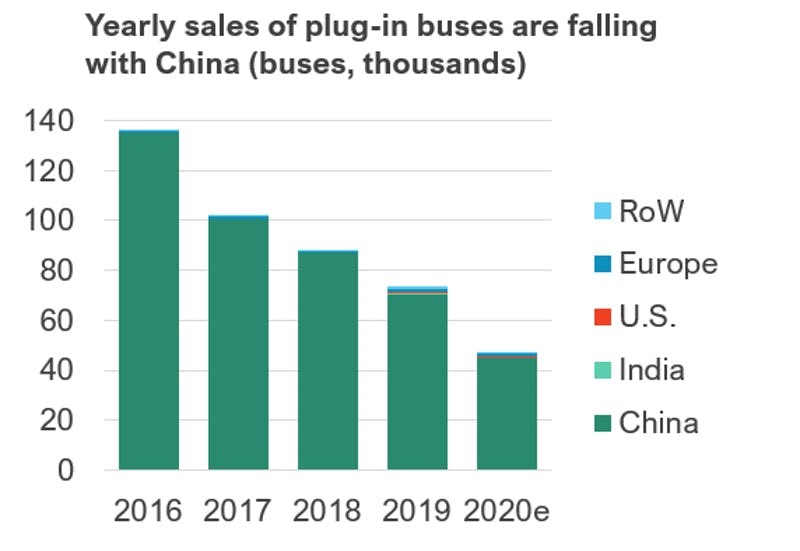Battery electric city buses: a $25bn market in 2030
The bus market is at a crossroads. The pressing need for cities around the world to improve air quality, alongside commitments by many governments to address climate change, are powering plans to deliver zero on-road emission battery electric city bus solutions. Over the next decade these efforts will see major cities increasingly refuse to purchase anything but zero-emission buses, as they deliver on promised zero-emission zones to protect the health of their citizens.
The new report from IDTechEx, 'Electric, Hybrid and Fuel Cell Buses 2021-2040', offers their in-depth analysis of this evolving market, highlighting major developments over the past year, and presenting for the first time their extended outlook to 2040 for pure electric, plug-in hybrid and fuel cell buses.
Over this twenty-year period, IDTechEx suggest uptake of zero-emission buses will primarily be of pure battery electric models, with plug-in hybrid rapidly losing market share and fuel cell electric buses taking only a small fraction of the market, as they fail to offer the same total cost of ownership benefit as battery electric buses. There remain significant cost barriers as well as uncertainty on how the necessary supply of cheap green hydrogen will be produced to deliver FCEVs promised environmental and economic credentials. On a CO2 footprint basis, the use of grey hydrogen (hydrogen produced from fossil fuels with no CO2 capture), makes no sense. Currently 96% of hydrogen produced is grey hydrogen.
Progress is being made on the development of FCEV buses; however, they are chasing a moving target. With falling battery pack prices, improving charging infrastructure and bus schedule/charging optimisation for BEV, by the time sufficient hydrogen infrastructure is available to enable the widespread commercialisation of FCEV buses their deployment may be limited to long daily mileage applications.
China has led the world in bus electrification and will continue to do so over the next 20 years. However, as a result of the subsidy phase-outs and the increasing saturation of electric buses in Tier 1 cities, IDTechEx project the electric bus sales in China will stabilise at a lower level than during the subsidy boom years, after the biggest decline yet in 2020 from the COVID-19 pandemic.

Source: Industry Associations, IDTechEx
Whilst Chinese OEMs will no longer receive large subsidies in China (which have amounted to billions of dollars), the support has already established a world-beating cost base and technology, which is spreading to other countries. For example, Europe sold over 1,800 electric buses in 2019, up from around 750 in 2018, with BYD and Yutong as key suppliers. As the Chinese electric bus market saturates, we expect to see an increased presence of Chinese bus OEMs in other bus markets around the world.
In the US, California is leading the way with its' commitment to an all-electric transition of its' public bus fleet by 2040. The second phase of India Faster Adoption and Manufacturing of (Hybrid) and Electric Vehicles (FAME) scheme recently sanctioned the deployment of 5,095 electric city buses, and the Indian government have ambitious aims to convert the nations fleet to EVs. Outside of these regions many countries around the world are looking to battery electric city buses; for example several South American nations have been purchasing electric buses, primarily from Chinese OEMs; in Russia, Moscow has ordered electric buses from the Russian OEMs Kamaz and GAZ Group; and in Korea, Hyundai have been developing electric buses in the effort to help reduce traffic congestion and air pollution.
The market is shifting rapidly and several of the giants of the industry, who are still primarily promoting diesel buses, risk being left behind. The new report from IDTechEx, 'Electric, Hybrid and Fuel Cell Buses 2021-2040', examines how the bus is currently being reinvented and looks to the further into future, to the rise of a new category, the autonomous shuttle.
This report also forms a part of the broader electric vehicle and energy storage research at IDTechEx, where we track the adoption of electric vehicles, battery trends and demand across more than 100 different mobility sectors, summarised in one master report, 'Electric Vehicles 2020-2030: 2nd Edition'.


